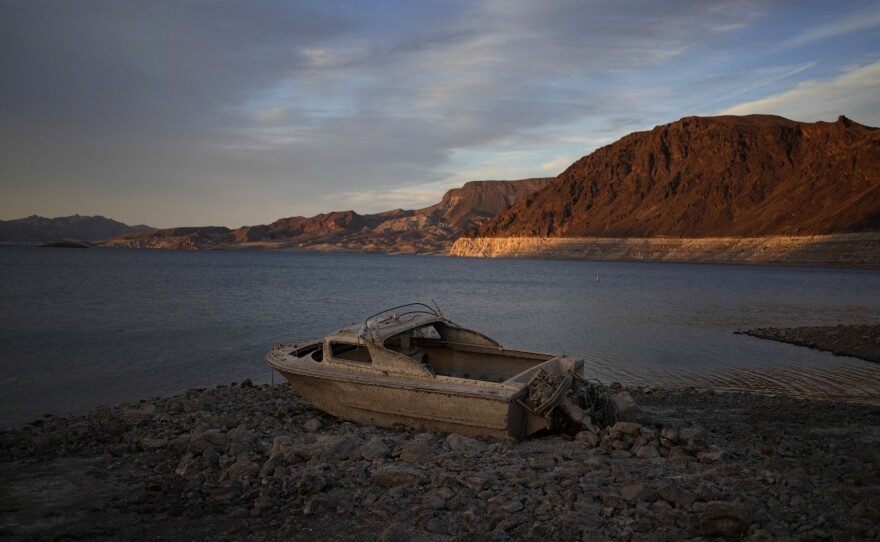One of the nation’s oldest environmental groups is suing Imperial County’s powerful water agency over a recent deal meant to help conserve the parched Colorado River.
Under the terms of the deal, the Imperial Irrigation District, or IID, will try to cut back its consumption of Colorado River water by 750,000 acre feet over the next three years. In return, the agency and farmers who conserve water could receive more than $600 million from the federal Bureau of Reclamation.
But those cutbacks will also reduce the amount of water flowing into the Salton Sea, which is slowly drying up. That could accelerate the release of harmful particles into the air from the exposed lakebed, according to the Bureau of Reclamation’s own environmental assessment of the deal.
That's led the Sierra Club to challenge the deal, arguing it violates state law and puts residents along the Salton Sea in greater danger of breathing in toxic, chemical-laden dust.
Those costs, the environmental group says, weren’t taken entirely into account because IID didn’t do a full analysis of the deal under the state’s cornerstone environmental law, the California Environmental Quality Act. The group also alleges that IID didn’t account for the impact on desert wildlife.
Earlier this month, the Sierra Club’s San Diego chapter filed a lawsuit in Imperial County Superior Court, asking a judge for an injunction to halt the agreement.
“They need to have an environmental impact report that will show that there is a need to mitigate some of these environmental catastrophes,” said Richard Miller, the San Diego chapter’s director.

A double-edged environmental crisis
The Sierra Club’s lawsuit highlights the growing tension between the Imperial County water agency's duties as a steward of the Colorado River and its efforts to slow worsening conditions around the Salton Sea.
It also underscores the immense consequences that those decisions have for the lives and health of Imperial Valley residents.
On one hand, the Colorado River is suffering greatly under the weight of drought and climate change. The mighty river serves as a water source for 40 million people across the United States and Mexico. But in recent years, federal regulators have feared that it could stop flowing altogether.
IID is one of the river’s largest users and has some of the longest-standing legal rights to draw water from the river.
On the other hand, the Salton Sea has been slowly drying up for years now. The vast lake has no natural rivers that feed into it. Instead, it’s fed entirely by the water IID draws from the Colorado River and redirects to the Imperial Valley’s farms. Some of that water soaks into the soil and irrigates crops, but the rest flows off of the fields and into the lake.
As the lake retreats, it’s slowly exposing a lakebed full of pesticides and other harmful chemicals. Studies have found high rates of asthma among elementary schoolers in nearby towns like Calipatria, Niland and Brawley.
IID officials said they are confident that the deal complies with state law.
Tina Shields, who oversees the district’s water department, said they had already undergone a federal environmental analysis with the Bureau of Reclamation, which was published in early August. In the agreement, IID pledged to monitor the water levels flowing into the Salton Sea and watch out for changes to plant growth along the edge of the lake.
Legally, Shields said, the state of California is supposed to be restoring the Salton Sea. She said IID worked hard to get $250 million of new federal funding included in the deal for state restoration work.
Shields also emphasized that the Colorado River is the Imperial Valley’s only source of freshwater.
“If the Colorado River crashes, there is zero water going into the Sea,” she said. “So we have to be very mindful of managing the system as a whole.”
Still, the Bureau of Reclamation’s analysis does show the new deal will make the Salton Sea shrink faster over the next few years. That means that the sea could release dust, toxic gasses and dangerous particles sooner than expected.
Miller said the Sierra Club supports the overarching goal of protecting the Colorado River, but they wanted to see IID conduct a full state environmental analysis and commit to more restoration work around the Salton Sea.
A spokesperson for the Bureau of Reclamation declined a request for comment, citing the pending lawsuit.
Like Shields, Miller also holds the state largely responsible for the Salton Sea’s slow decline. He said the vast lake — the largest in California — is a treasure that the state should be proud of.
“It just doesn't get the attention in Sacramento that it deserved all these years,” he said.





